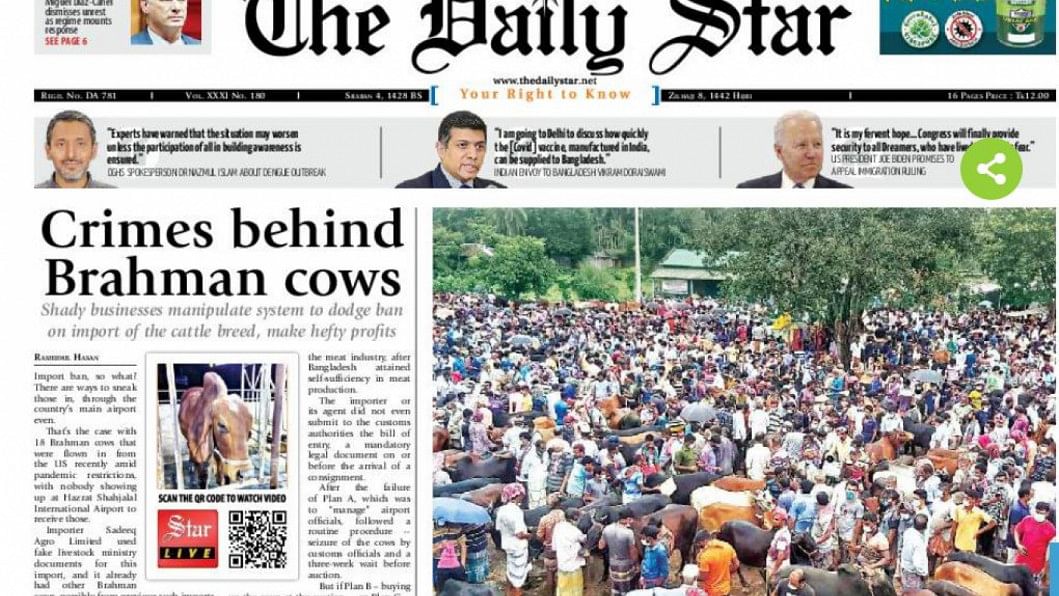Crimes behind Brahman cows
Import ban, so what? There are ways to sneak those in, through the country's main airport even.
That's the case with 18 Brahman cows that were flown in from the US recently amid pandemic restrictions, with nobody showing up at Hazrat Shahjalal International Airport to receive those.
Importer Sadeeq Agro Limited used fake livestock ministry documents for this import, and it already had other Brahman cows, possibly from previous such imports, on sale at its farm, finds an investigation by The Daily Star.
Forged documents, copies of which this correspondent was able to obtain, were used to dodge the government's ban imposed in 2016 on import of the Brahman cows, one of the cattle breeds meant for the meat industry, after Bangladesh attained self-sufficiency in meat production.
The importer or its agent did not even submit to the customs authorities the bill of entry, a mandatory legal document on or before the arrival of a consignment.
After the failure of Plan A, which was to "manage" airport officials, followed a routine procedure -- seizure of the cows by customs officials and a three-week wait before auction.
But if Plan B -- buying up the cows at the auction -- or Plan C -- paying a fine by the court -- worked out, the importer Sadeeq Agro Limited would still be able to get these giant American-breed cattle of Indian origin to its farm in Mohammadpur's Beribadh area.
Only about two months back, another agro farm named Dairy Sun in Dhaka secured 30 Brahman cows with a nominal penalty and an apology to the court.
Contacted on July 8 and again on July 9, Mohammad Imran Hossain, proprietor of the Sadeeq Agro, gave different versions about the import documents and the reason for importing the cows: "no document was submitted", he was "not aware of forged document submission", "there were mistake", "cows were for research purpose", and the "cows were a gift" and so on.
Imran also insisted that this is the first time Sadeeq Agro imported Brahman cows.
But this correspondent, who went to the farm posing as a customer, was offered a two-year-old Brahman cow -- a livestock official confirmed the breed upon seeing a photograph -- at Tk 15 lakh with an expected yield of 800kg of meat.
Requesting not to be named, the owner of another agro farm who had earlier imported Brahman cattle illegally from the US, said he spent about Tk 58,000 on each cow.
Sources said Sadeeq Agro had earlier imported around 200 Brahman cows in five consignments -- a claim denied by its owner.
Sadeeq Agro, established on two acres of land in Mohammadpur's Beribadh area, has around 3,000 cows of different breeds. Many portions of the farm were set up by occupying a canal, alleged locals.

PAPERS ALL FAKE
The Daily Star obtained three documents, submitted by Sadeeq Agro, under which Turkish Airlines brought the Brahman cows in its cargo plane on July 5. A Turkish Airlines official said various other goods were transported to Bangladesh on the same cargo aircraft these cows were flown in.
The documents -- a no objection certificate regarding the cattle import, a letter from the Animal Quarantine Division of the Department of Livestock Services, and the cattle import authorisation from the US -- were found to be fake by customs officials.
Agro Trade International was mentioned as the exporter under the address 7020 Hwy 75, South Madisonville, Texas.
The Daily Star, on July 10, emailed the US consigner Agro Trade International listed -- asking if they had sent those cows to Sadeeq Agro for research purposes as claimed by the owner. This correspondent hasn't received a reply yet.
All three documents submitted by the importer, dated May 25, were signed by "Dr Mohammad Omar Farqe, assistant director (quarantine) AC, Department of Livestock Services".
When showed the three documents, Sadeeq Agro owner Imran said he was not aware of submitting any such documents to the Department of Livestock Services or to the fisheries and livestock ministry.
The Daily Star found an official named Mohammad Omar Faruque, an upazila livestock officer, now on deputation at the Hazrat Shahjalal International Airport as veterinary pathologist of the livestock quarantine station.
Contacted, Faruque said he never signed any documents provided by Sadeeq Agro.
"Actually, I don't have the authority to issue such documents on behalf of the department. Sadeeq Agro didn't even spell my name correctly," he said.
The mobile phone number mentioned in the documents does not belong to Faruque. On calling the number through the Truecaller app, the name that appears is one SM Reza.
This correspondent repeatedly called this number for several days, only to find it switched off.
Dr Shaikh Azizur Rahman, director general of the livestock department, told The Daily Star on July 9 that all three documents are forged as the department didn't provide any such documents to Sadeeq Agro.
He also confirmed that import of Brahman cows is banned since 2016 and said, "How dare Sadeeq Agro import those cows with all those forged documents!"
CONTRADICTORY VERSIONS
On July 8, Imran claimed that Agro Trade International sent the 18 Brahman cows for research and development purposes to see whether Bangladesh's tropical weather "suits the Brahman cow".
Asked whether they had got the NOC from the ministry concerned, he said they were yet to get it though they submitted the necessary papers several months back to the livestock department and the ministry. "The Covid-19 pandemic delayed the ministry's process."
But, he claimed, the consignor had sent the consignment in the meantime. The supplier made some mistakes while sending those cows, he said, without elaborating what kind of mistakes.
He contradicted his own statements a day later, saying he didn't actually provide any documents to the livestock department or the ministry for an NOC -- presuming that importing cattle for research and development purposes would not require an NOC.
He then said, "As it was a gift from Agro Trade International, that's why we had thought NOC will not be required for receiving these gifts."
At one stage, Imran showed a paper to this correspondent titled "US Origin Health Certificate for Export of Cattle to the Bangladesh from the United States". Surprisingly, the certificate issue date was written in Bangla.
Imran, also president of the Bangladesh Dairy Farmers Association, claimed they had submitted all other documents to the respective authorities including customs.
Asked why customs officials had seized the cows then, he said they did it because Sadeeq Agro hadn't submitted an NOC.
Imran said two months an agro farm named Dairy Sun in Dhaka had imported 30 Brahman cows, which were seized by customs officials.
That farm later got those cows back after giving some penalty money to customs following filing of a case with the High Court, he said, adding his plan was to take the same course if his cattle were not released by customs.
Masudul Islam Jesun, managing director of Dairy Sun, admitted that they imported 30 Brahman cows though the farm only had an NOC for importing Australian Friesian cows.
As officials filed a case, the High Court asked customs to hand over those cows after paying a penalty. "We had to pay Tk 35 lakh to customs to release those cows," he added.
WHAT TURKISH AIRLINES SAYS
Asked why and how they carried a cargo consignment although Sadeeq Agro's documents were fake, a top official of Turkish Airlines in Dhaka said it is not their task to verify the papers provided by the importer and agent of the consigner specially when the imported items are not sensitive.
"According to our airline's rules, we will just have to be sure whether the imported items are suitable for freighter service," he said, requesting anonymity, earlier this month.
"The importer sent documents of livestock ministry to the consignor in the US and his agent chose our cargo service," he added.
The official said as no representative from Sadeeq Agro was found after landing of the cargo aircraft. "The customs officials wanted to see the documents from us and they later found those to be totally fake."
Md Moazzem Hossain, commissioner of Dhaka Customs House at HSIA, said they seized the cattle imported by Sadeeq Agro and sent these to the custody of the Central Cattle Breeding and Dairy Farm, Savar, as the consignee could not submit the bill of entry.
Asked about legal measures customs can take, he said, "From the day of arrival, the consignee will get 21 days to submit all documents and then we will assess these. If they fail to give the documents, we will go for legal action," he told The Daily Star on Saturday.
Queried as to what could be the possible punishment for importing cattle with forged documents, Moazzem refused to comment further.

 For all latest news, follow The Daily Star's Google News channel.
For all latest news, follow The Daily Star's Google News channel. 






Comments